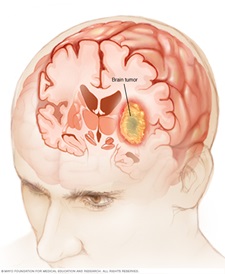
Spine & Neurological Surgery
Brain Tumor Symptoms & Treatment in Barron

A brain tumor is a mass or growth of abnormal cells in your brain or close to your brain. Many different types of brain tumors exist. Some brain tumors are noncancerous, or benign, and some brain tumors are cancerous , or malignant. Brain tumors can begin in your brain, also called primary brain tumors, or cancer can begin in other parts of your body and spread to your brain, also called secondary, or metastatic, brain tumors.
Brain tumor symptoms
Brain tumor symptoms depend on the tumor's size, location, or how fast it is growing.
Some signs and symptoms caused by brain tumors include:
- Headaches or migraines that happen more often or are more severe
- Seizures
- Blurry vision, seeing double or losing sight on the sides of your vision
- Loss of feeling or movement in an arm or a leg
- Loss of balance, dizziness or feeling unsteady
- Personality changes
- Memory loss or difficulty thinking or finding words
Brain tumor treatment options depend on the type of brain tumor you have, as well as its size and location. If the brain tumor is located in a place that makes it accessible for an operation, your surgeon will first explain all options, including the potential benefits and risks of surgery. Then, he or she will work to remove as much of the brain tumor as possible.
Brain tumor biopsy and removal
A biopsy is the surgical procedure to collect and test a sample of the abnormal tissue. Biopsies can be performed as part of an operation to remove the brain tumor, or a biopsy can be performed using a needle. A stereotactic needle biopsy may be done for brain tumors in hard to reach areas or very sensitive areas within your brain that might be damaged by a more extensive operation. The biopsy sample is then viewed under a microscope to determine if it is cancerous or benign. Sophisticated laboratory tests can give your doctor clues about your prognosis and your treatment options.
If the brain tumor is located in a place that makes it accessible for an operation, your surgeon will work to remove as much of the brain tumor as possible.
In some cases, tumors are small and easy to separate from surrounding brain tissue, which makes complete surgical removal possible. In other cases, tumors can't be separated from surrounding tissue or they're located near sensitive areas in your brain, making surgery risky. In these situations your doctor removes as much of the tumor as is safe.